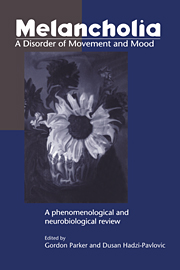Book contents
- Frontmatter
- Contents
- List of contributors
- Acknowledgments
- Introduction
- Part One Classification and Research: Historical and Theoretical Aspects
- Part Two Development and Validation of a Measure of Psychomotor Retardation as a Marker of Melancholia
- 5 Psychomotor Change as a Feature of Depressive Disorders: Historical Overview and Current Assessment Strategies
- 6 Development and Structure of the CORE System
- 7 Reliability of the CORE Measure
- 8 Validity of the CORE: I. A Neuroendocrinological Strategy
- 9 Validity of the CORE: II. Neuropsychological Tests
- 10 Validity of the CORE: III. Outcome and Treatment Prediction
- 11 Phenotypic Expression of Melancholia Contrasted for Those with Bipolar and Unipolar Illness Courses
- 12 Psychotic Depression: Clinical Definition, Status and the Relevance of Psychomotor Disturbance to Its Definition
- 13 A Clinical Algorithm for Defining Melancholia: Comparison with Other Sub-typing Measures
- 14 Rating the CORE: A User's Guide
- Part Three The Neurobiology of Melancholia
- The CORE Measure: Procedural Recommendations and Rating Guidelines
- References
- Author Index
- Subject Index
12 - Psychotic Depression: Clinical Definition, Status and the Relevance of Psychomotor Disturbance to Its Definition
from Part Two - Development and Validation of a Measure of Psychomotor Retardation as a Marker of Melancholia
Published online by Cambridge University Press: 04 August 2010
- Frontmatter
- Contents
- List of contributors
- Acknowledgments
- Introduction
- Part One Classification and Research: Historical and Theoretical Aspects
- Part Two Development and Validation of a Measure of Psychomotor Retardation as a Marker of Melancholia
- 5 Psychomotor Change as a Feature of Depressive Disorders: Historical Overview and Current Assessment Strategies
- 6 Development and Structure of the CORE System
- 7 Reliability of the CORE Measure
- 8 Validity of the CORE: I. A Neuroendocrinological Strategy
- 9 Validity of the CORE: II. Neuropsychological Tests
- 10 Validity of the CORE: III. Outcome and Treatment Prediction
- 11 Phenotypic Expression of Melancholia Contrasted for Those with Bipolar and Unipolar Illness Courses
- 12 Psychotic Depression: Clinical Definition, Status and the Relevance of Psychomotor Disturbance to Its Definition
- 13 A Clinical Algorithm for Defining Melancholia: Comparison with Other Sub-typing Measures
- 14 Rating the CORE: A User's Guide
- Part Three The Neurobiology of Melancholia
- The CORE Measure: Procedural Recommendations and Rating Guidelines
- References
- Author Index
- Subject Index
Summary
Introduction
We will first provide evidence of quite contrasting views about the subtyping of psychotic (delusional) depression. Next we will report two studies that consider whether it has any specific or over-represented clinical features (examining psychomotor disturbance in particular), and then we will consider its status as a separate entity or a sub-type of some other broader depressive condition. Our two studies were undertaken as components of the CORE I and CORE II studies (reported in Chapter 6); methodological issues are only summarised here.
Psychotic Depression: Synonymous with, or Distinct from, Melancholia? It is relatively easy to establish quite varying theoretical views about the relationship of psychotic depression to melancholia. An early separatist (in viewing the condition as distinct) was Maudsley (1895), who distinguished between “melancholia” and “melancholia with delusions.” More recently, Minter and Mandel (1979) suggested that, in the United States, psychotic depression had “come to mean the same as ‘endogenous depression’ or to mean a depression of severe proportions, usually with endogenous symptomatology, not necessarily with symptoms of psychosis.” As well, psychotic and endogenous depression have been used as synonymous terms by proponents of the contrasting unitary (e.g., Kendell 1976) and binary (e.g., Kiloh et al. 1971) views of depression classification. Thus, we observe two contrasting views – one essentially regarding the condition as synonymous with melancholia, the other regarding it as a separate disorder.
Classificatory Status
In most official classifications of psychotic depression, psychotic features figure prominently, together with two variable constructs – functional impairment and psychomotor disturbance.
- Type
- Chapter
- Information
- Melancholia: A Disorder of Movement and MoodA Phenomenological and Neurobiological Review, pp. 179 - 201Publisher: Cambridge University PressPrint publication year: 1996
- 6
- Cited by



